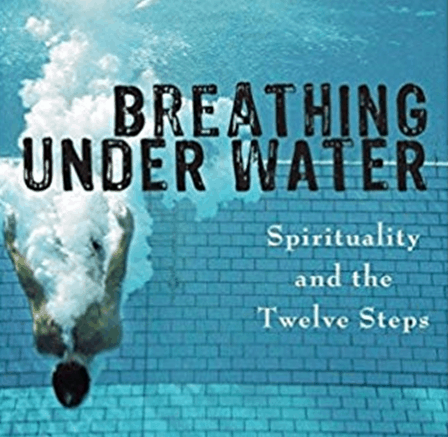Step 5: “Admitted to God, to ourselves and to another human being the exact nature of our wrongs.”
Scripture for Sunday: John 20:19-23
19 When it was evening on that day, the first day of the week, and the doors of the house where the disciples had met were locked for fear of the Judeans, Jesus came and stood among them and said, “Peace be with you.” 20 After he said this, he showed them his hands and his side. Then the disciples rejoiced when they saw the Lord. 21 Jesus said to them again, “Peace be with you. As the Father has sent me, so I send you.” 22 When he had said this, he breathed on them and said to them, “Receive the Holy Spirit. 23 If you forgive the sins of any, they are forgiven them; if you retain the sins of any, they are retained.”
Notes on the Text:
The Gospel of John may seem a little too theological or otherworldly to us because of the seemingly philosophical language in it. But an awareness of the historical and political context of the Gospel shows us that it is deeply rooted in the daily struggles of human life. Jesus came in a specific time and place in history. According to biblical scholars the Gospel of John was written sometime around the year 90 CE. We don’t know the author because the title was added later. A lot was taking place in that region of the world at the time. The Jewish revolt against the Roman Empire took place around the year 70 CE. The Empire crushed the revolt and destroyed the temple in Jerusalem. In addition, the Jewish people were forced to pay a temple tax to the temple of Jupiter on the Capitoline Hill in Rome. So it became a tough issue to decide who was supposed to pay this tax. Who was considered a Jew according to the Romans? The followers of Jesus were becoming a sect of their own. Even though they practiced the Jewish ways, many of them were not considered Jewish legally because they were not circumcised. Also, after the destruction of the temple, there were some major differences developing between the Jews and the Jews who followed Jesus. The followers of Jesus were beginning to emerge as a separate group. Another issue here related to the context is the allegiance of the Christians to Jesus. One of the things that distinguished the Christians from some of the other religions at that time was their insistence of their allegiance to Jesus and refusing to bow down before the emperor as their lord. The Roman emperor was seen as Lord, Savior or the World, and the Son of God. Interestingly enough these were the titles which Christians gave to Jesus. These were very politically charged titles at the time indicating that the allegiance of the followers of Jesus was given only to Jesus and not to the emperor. As a result, many Christians were put on trial and persecuted for their faith.
With these issues in mind, we come to the Gospel of John knowing that the author of the Gospel presented Jesus’ identity and mission through elements and themes that were especially significant for Christian readers facing Roman imperial claims and for any who faced Roman persecution. It was important to present the story of Jesus not just as a narration of historical events, but as a continuation of God’s work of creation and redemption for the people of God, the people of ancient Israel. The whole story of our faith is about God creating and redeeming us throughout history from whatever holds us hostage, especially the cultures and mindsets that believe in violence, domination, and accumulation.
This context helps us to get into the text today as Jesus had been crucified, resurrected and then appeared to his disciples to bless and commission them to continue his ministry. He saw his mission as the restoration and healing of his people and the whole world. He knew that love was the only force strong enough to bring restoration. Jesus also knew the importance of accountability and grace and so in this conversation in John 20 with his disciples, he urged them to do the hard work of forgiving people. This conversation took place in the evening of the same day when Mary Magdalene, Peter, and the other disciple had discovered that Jesus was resurrected. We are back in the time of darkness, and as we know, darkness and light are important themes in the Gospel of John. Jesus is the light that comes into the darkness of the world. One would expect the disciples to be rejoicing and celebrating after realizing that Jesus was resurrected. Instead, we find them meeting in a secret place with locked doors because they were afraid of the authorities. The fear of the crucifixion was still gripping their hearts. As Jesus appeared to them, he gave them the peace and courage they needed to let go of their fear and to continue his mission. I love the details of the story. Jesus got so close to them that he breathed on them. They were afraid and hiding. They were not sure what the future was going to hold for them. Jesus gave them the power they needed through his very breath. He gave them his breath/Spirit in order for them to find the power and courage to forgive sins, or in other words to restore the broken. In verse 23 the Greek word ἀφίημι is often translated “forgive,” especially when it is used in relation to “sin” ἁμαρτία. Yet, a better translation of the word is “brokenness.” Sin is not just about moral or immoral behaviors, it is also about something deeper: Our sense of self and our shadow motivations and triggers. Jesus was giving the disciples his very spirit to be able to heal and release the brokenness that is within us. Think of how important that was for their time under the pressures and fears of the Roman Empire. Jesus knew the traditional pattern for forgiveness of sins through the temple and offering sacrifices. That system only made people more stuck, especially when the temple leadership became controlled by the Romans. Richard Rohr presents the following pattern in his book Breathing Under Water as the one Jesus came to transform:
sin → punishment → repentance → transformation
Rohr writes that this pattern is not biblical, and it does not lead us to true transformation. He writes, “God resists our evil and conquers it with good…God shocks and stuns us into love. God does not love us if we change, God loves us so that we can change.” Rohr follows in what Jesus taught the disciples about wholeness, love, and grace to present this pattern:
sin → unconditional love → transformation → repentance
That is why Jesus needed to give the disciples his Spirit (breath) in order to help them follow his example of radical love. Jesus’ commission to the disciple to forgive and redeem others in his way was very challenging to the disciples and it cost them a lot. Some of them even lost their lives because of it. His call to this kind of restoration through radical love is still challenging today because we have a hard time balancing grace with accountability.
For Reflection:
The invitation of Jesus to forgive/restore others in his way is very challenging for us because we live in a world of retribution, punishment, and revenge. To look at our mission as restorers and healers who are nonjudgmental takes a power beyond ourselves; the very breath of God upon us. Yet, it is important to remember that Jesus was not saying that anything goes. He was challenging his followers to use nonviolence and love as the tools to hold others accountable.
We need others to remind us of our inner goodness when we fail. We need others to hold us accountable so that the shadow stuff can come to light, but in healthy ways and in the service of God’s light. That is why, finding a friend or a guide who can provide a nonjudgmental presence is so essential for our own healing. This call of Jesus to the disciples to restore others to wholeness is our own call. It is not limited to counselors or pastors. It is about each of us providing that empathetic presence to the people of our lives. Thus it is important for us to learn about empathy, whether we are being called to offer it or seek it; i.e., whether we are the ones seeking to help us with Step 5 or being the ones helping others with that step. Brené Brown gives very helpful points about this ability to offer empathy when someone is ready for Step 5. Here is a list of four essential empathy skills:
- To see the world as others see it, or perspective taking: “One of the signature mistakes with empathy is that we believe we can take our lenses off and look through the lenses of someone else. We can’t…What we can do, however, is honor people’s perspectives as truth even when they’re different from ours…Perspective taking requires becoming the learner, not the knower.”
- To be nonjudgmental: Staying out of judgment means being aware of where we are the most vulnerable to our own shame, our own struggle. The good news is that we don’t judge in areas where we feel a strong sense of self-worth and grounded confidence.
- To Understand another person’s feelings: Understanding emotions in others and communicating our understanding of these emotions require us to be in touch with our own feelings…Emotional literacy…is as critical as having language. When we can’t name and articulate what’s happening to us emotionally, we cannot move through it.
- To communicate your understanding of that person’s feelings: Communicating our understanding of the emotions, can feel like the biggest risk because we can get it wrong.
Step 5 is challenging and scary as we are fearful of being judged. Yet, without the ability to name and face the truth about ourselves with another human being, we allow the shadow stuff to remain hidden. We need this accountability for our healing and the key is finding the right person who can listen and get in that deep place with us with empathy and care. If you don’t have that kind of person in your life or if you are not that kind of person for someone, ask God to help guide you in this process of discovery and growth.
A Friendship Blessing by John O’Donohue:
May you be blessed with good friends.
May you learn to be a good friend to yourself.
May you be able to journey to that place in your soul where there is great love, warmth, feeling, and forgiveness.
May this change you.
May it transfigure that which is negative, distant, or cold in you.
May you be brought in to the real passion, kinship, and affinity of belonging.
May you treasure your friends.
May you be good to them and may you be there for them; may they bring you all the blessings, challenges, truth, and light that you need for your journey.
May you never be isolated.
May you always be in the gentle nest of belonging with your anam cara (soul friend). Amen.


